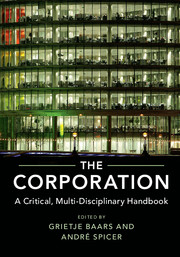Book contents
- Frontmatter
- Contents
- List of Contributors
- Acknowledgements
- Introduction: Why the Corporation?
- PART I DISCIPLINARY OVERVIEWS
- PART II INTERDISCIPLINARY THEMATIC CHAPTERS
- 1 The Evolution of the Corporate Form
- 2 The Multinational Corporate Group
- 3 The Financialization of the Corporation
- 4 Corporate Value Chains
- 5 Corporate Citizenship
- a The Functions and Dysfunctions of Corporate Social Responsibility
- b Reconsidering the Critical Corporate Social Responsibility Perspective through French Pragmatic Sociology: Subverting Corporate Do-Gooding for the Common Good?
- c Certification Schemes and Labelling as Corporate Governance: The Value of Silence
- 6 The Corporation and Crime
- 7 The Corporation and Ideology
- 8 Corporation and Communities
- 9 Corporations and Resistance
- 10 Alternatives to the Corporation
- Index
- References
c - Certification Schemes and Labelling as Corporate Governance: The Value of Silence
from 5 - Corporate Citizenship
Published online by Cambridge University Press: 31 March 2017
- Frontmatter
- Contents
- List of Contributors
- Acknowledgements
- Introduction: Why the Corporation?
- PART I DISCIPLINARY OVERVIEWS
- PART II INTERDISCIPLINARY THEMATIC CHAPTERS
- 1 The Evolution of the Corporate Form
- 2 The Multinational Corporate Group
- 3 The Financialization of the Corporation
- 4 Corporate Value Chains
- 5 Corporate Citizenship
- a The Functions and Dysfunctions of Corporate Social Responsibility
- b Reconsidering the Critical Corporate Social Responsibility Perspective through French Pragmatic Sociology: Subverting Corporate Do-Gooding for the Common Good?
- c Certification Schemes and Labelling as Corporate Governance: The Value of Silence
- 6 The Corporation and Crime
- 7 The Corporation and Ideology
- 8 Corporation and Communities
- 9 Corporations and Resistance
- 10 Alternatives to the Corporation
- Index
- References
Summary
Introduction
If we were to walk along the shelves of any large-scale retailers in the Global North we would notice that they are constantly refilled with products that come with small logos attached. Images of trees, frogs and fish are increasingly appearing on packaging, labels and websites, together with words like ‘organic’, ‘bio’ and ‘sustainable’. Although these pictures and codes seldom offer an explanation of their meaning and instead rely on the appeal of a design and its catchy acronym, they seem capable of persuading wealthy and conscious consumers of the reasonableness and legitimacy of their claim. Moreover, they are often perceived as a sophisticated and effective source of buyers’ collective power.
From the point of view of the market–consumer relationship, however, the graphical representation of the (often not specified) standard operates as the visible sign of the not-so-visible mechanism of capitalist expansion and consolidation of transnational value chains. In particular, the little frog associated with the protection of rain forests has three main functions: from a governance perspective, it produces in customers the expectation and the belief that they are purchasing products that have not been obtained through environmental destruction, slavery or other forms of rampant exploitation; economically, it justifies the extra premium that is generally paid in order to have access to a ‘superior’ class of commodities; morally, it convinces the broader public that a change in the way in which businesses operate shall not be achieved by acting against corporate actors or by sanctioning those who release negative externalities, but rather by rewarding those businesses that openly declare that they are following ‘higher standards’.
However, this chapter claims that these certifications and ecolabels are based on an inherent contradiction that leads to often unnoticed consequences. Despite the underlying assumption that these mechanisms of corporate governance lead to more transparency in the market, it is a matter of fact that sustainability statements appear only on some products. As a consequence, labelled goods are transformed into the exceptional and unique. On the other hand, images and statements that highlight the exploitative or unhealthy nature of products – what could be called ‘non-ecolabels’ – are almost non-existent in the market and have been strongly opposed by multinational corporations operating in different sectors (from cocoa to computers).
- Type
- Chapter
- Information
- The CorporationA Critical, Multi-Disciplinary Handbook, pp. 372 - 382Publisher: Cambridge University PressPrint publication year: 2017



